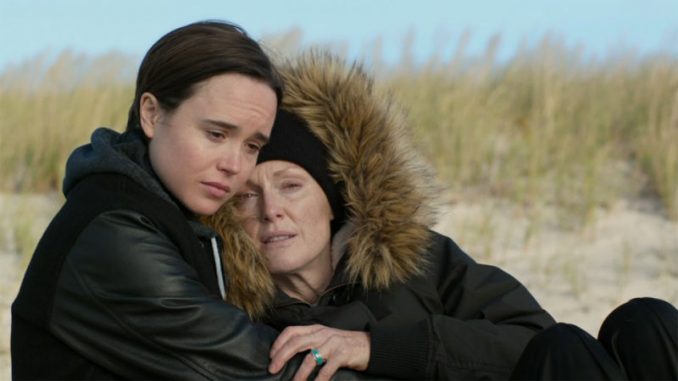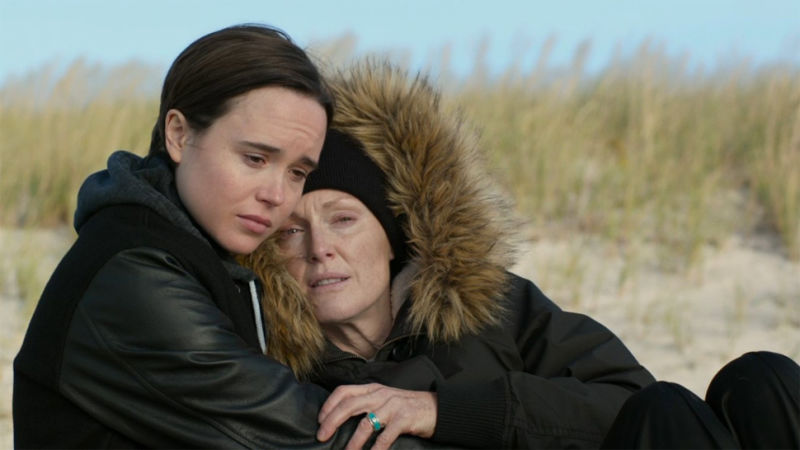

Freeheld, the Oscar-bait gay-rights drama in which Julianne Moore and Ellen Page played real life lesbian couple Laurel Hester and Stacie Andree, came and left theaters in October after grossing a little more than $500,000. At last week’s Vanguard Awards, hosted by the Los Angeles LGBT Center, Freeheld’s screenwriter Ron Nyswaner (who also wrote Jonathan Demme’s 1993 AIDS drama Philadelphia) described an unnamed “recent gay-themed project” that became watered down through compromise and fear. “The main characters were turned into Lesbians with lower case l,” he said.
His speech, which The Hollywood Reporter posted a full transcript of, urged cinematic queer pride and resistance to sanitized depictions of LGBT characters. Here’s the section of his speech that seemed to pertain to Freeheld:
For those of us who have that privilege I spoke of, earlier, of being artists — we have our challenges too. We must take care to protect our history and our culture. We must be careful — as we become mainstream — that we don’t forget we’re the descendants of outlaws and rebels. We must resist the tendency to be de-gayed.
One of my recent gay-themed projects had a lot of potential. But the producers became fearful. The gay characters were idealized. Their edges were smoothed out. The conflict between them was softened. Over my vigorous objections by the way, for the record.
The main characters were turned into Lesbians with lower case l.
Because God forbid someone might think we were making a movie about a couple of dykes. Out of fear, they were normalized. We must remember — and insist that others honor — our history and our very specific gay culture. We are the inheritors of a culture that was created from pain and invisibility. From being different.
And from that difference we created a powerful community that changed the world. Art about gay people has to recognize that power. The power of being different. We don’t have to be normalized to have all of our rights. And we don’t have to be normalized to be the main characters of film and TV shows. We can still be fags and dykes.
We need to have the courage to insist that our gay characters are created within the fullness of their humanity with all their flaws. Just like straight characters.
Ron Nyswaner can get several amens. Proving one’s equality by reducing his or her humanity is inherently paradoxical. It works as short-term solution, it yields immediate results—see the “regular guys” rhetoric of Paul Katami and Jeff Zarillo, one of the couples that served as plaintiffs in Perry v. Schwarzenegger, which overturned California’s Prop 8—but it is inherently disingenuous and culture-blind. Instead of nobly affirming the richness of diversity, it idiot-proofs the cause by reducing equality to similarity. It’s foolish. Anyone with a brain knows the world is more complex than this ethos, and that the world is a better, more honest place for having such visible complexity.
The sanitization of LGBT characters, while clearly done to make movies easier for mass consumption, is proving to be bad for business, too. Freeheld got mostly bad reviews and made just a fraction of its $7 million budget. Roland Emmerich’s Stonewall, a galling, two-hour string of movie-making compromises that by its director’s own admission featured a “straight-acting” protagonist to make it easier to watch, did even worse than Freeheld, grossing a paltry $187,674 and becoming a critical laughingstock (Stonewall’s reported budget was $17 million). One thing mainstream audiences want to see less than a gay movie is a bad gay movie.
It’s important to keep in mind, though, that Nyswaner is very much part of the system that he decries, that his strong words benefit from 20/20 hindsight. In an interview filmed at the Toronto Film Festival, which ran Sept. 8-18 this year thus before Freeheld’s Oct. 2 release date, Nyswaner bespoke a decidedly depoliticized approach to his work.
Beyond Cinema magazine’s Elliot V. Kotek asked the screenwriter, “You were an activist in the 70s for gay rights. Does that mean that in your art and in your writing, is that something that was a determination for you, that you were going to create art that aided the dialogue towards a better world of more acceptance?”
To this, Nyswaner replied, “In general, no. In general to me, tell me a great story, help me find a great story…Freeheld to me, was just being introduced to Laurel and Stacie and Michael, these characters, that’s what I care about as a writer. I care about character and story. In some way I hope the politics is buried beneath the human story.”
That’s not exactly in complete opposition to his Vanguard Awards speech, but the picture he paints here is a far cry from “a movie about a couple of dykes” as a statement in itself. I can’t help but wonder if he would have made that speech at all had audiences responded to the “normalized” depictions he put out.
[h/t Towleroad; Top image via Summit Entertainment]

